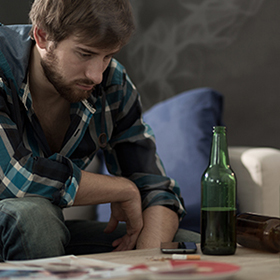 Plenty of people drink socially and many people have anxiety. Yet, when the two are mixed it can cause greater disquietude, especially in those with an existing anxiety disorder. In fact, those with an anxiety disorder of any kind are more susceptible to substance abuse by three times as much.
Plenty of people drink socially and many people have anxiety. Yet, when the two are mixed it can cause greater disquietude, especially in those with an existing anxiety disorder. In fact, those with an anxiety disorder of any kind are more susceptible to substance abuse by three times as much.
One of the astounding factors is that out of the population who have anxiety disorders, 20 percent or so, also have substance abuse problems. But that statistic is reversed too. Those who have substance abuse problems show figures of around 20 percent of a co-occurring anxiety disorder as well.
Here is more about anxiety and substance abuse – how the two work together, statistics, information on each problem, and the treatment options available.
Which Disorder is First?
There isn’t a specific set of numbers showing which comes first. In fact, many people with one of the disorders do not end up having the other disorder. A person with substance abuse issues does not necessarily have anxiety. And a person with anxiety does not automatically have a substance abuse issue. Yet, the two do go hand in hand at times and with some people.
Unfortunately, those who do experience anxiety disorder along with substance abuse issues sometimes realize that one makes the other worse.
Common Disorders With Substance Abuse
There are six types of anxiety disorder that include the following:
- Generalized anxiety disorder
- Obsessive-compulsive disorder
- Social anxiety disorder
- Posttraumatic stress disorder (PTSD)
- Panic Disorder
- Specific phobias
While any anxiety disorder may be common with substance abuse, here are some that are more likely to be present.
Posttraumatic Stress Disorder
Substance abuse and PTSD is quite common. Those with posttraumatic stress disorder often use alcohol or drugs to ease their anxiety symptoms. The problem is that substance abuse can exacerbate the problem and actually make the symptoms worse. Studies show that on average, alcohol abuse is secondary to PTSD.
Social Anxiety Disorder
This is another disorder where people often have substance abuse issues, too. Those with social anxiety disorder claim that alcohol helps them in a social situation. In some cases though, it makes the anxiety even more prevalent.
Panic Disorder
Alcohol or drugs often cause panic attacks, and having panic disorder is a risk factor for relapse among people with a substance abuse disorder. Alcohol abuse commonly begins before or at the same time as panic disorder symptoms.
Comorbidity
There is also what is known as comorbidity. According to Drugabuse.gov:
Comorbidity describes two or more disorders or illnesses occurring in the same person. They can occur at the same time or one after the other. Comorbidity also implies interactions between the illnesses that can worsen the course of both.
Need More Information?
Call now to be connected with one of our friendly, helpful admissions specialists.Co-Occurring Disorders or Dual Diagnosis
Substance abuse is more common in people with anxiety disorders than in the general population. For example, anxiety disorders have been linked with higher lifetime rates of alcohol abuse and higher relapse rates after alcohol rehab, notes Psychiatric Times, and individuals with anxiety may also experience more severe withdrawal symptoms when they stop using alcohol or drugs.
The existence of a substance use disorder with an anxiety disorder or another form of mental illness is known as a dual diagnosis or co-occurring disorders.
Here are a few examples of why an anxiety disorder may trigger substance abuse or how substance abuse might lead to anxiety:
Self-Management
A popular theory of the coexistence of anxiety disorders and substance abuse is that the individual may use drugs or alcohol to self-medicate. This is in order to attempt to control the symptoms of anxiety – for example, a person has a few drinks before conducting a meeting or speaking to a crowd.
Biochemical Factors
Some people have chemical imbalances, and both of these disorders may be related to that. One example is those with mental illness or alcoholism. Both are linked to a chemical imbalance of low serotonin. This is a neurotransmitter that regulates some of our most important elements. These include metabolism, sleep, energy levels, mood, and a variety of other functions.
Genetic Predisposition
Those who have family members with one or both of the disorders are often more likely to be so themselves. It is more than likely that genetics play a part in anxiety, as well as substance abuse, and research seems to show that.
Effects of Substance Abuse or Withdrawal
This is where things are part of a vicious cycle. If a person with anxiety stops using substances like drugs or alcohol, some of the side effects are the very thing they were trying to medicate, like nervousness, insomnia, and restlessness.
Dual Treatment for Anxiety and Substance Abuse
Both anxiety and substance abuse are highly treatable. A few of the treatment plans include medication, therapy, and behavioral modification strategies.
At Transformations, dual diagnosis treatment is available. While each person’s treatment is customized just for them, each one has a combination of a few of these options:
- Detoxification
- Individual, family, and group therapy
- Life skills
- Holistic healing
- Coping skills classes
- Transitional sober-living style options
Another treatment option we offer is Eye Movement Desensitization and Reprocessing, or EMDR. This is a treatment method focusing on the past, present, and future. The client thinks of a disturbing event. The client is then led through eye-tracking movement or bilateral stimulation. It has proven to be effective according to a study published in the Journal of Psychoactive Drugs.
At Transformations, the goal is to have the client make new, less stressful associations to the image, gain insight into themselves so they can change their behavior, and develop specific skills that will help them handle situations better in the future.
If you or someone you love has both anxiety and substance abuse issues, we can help with our custom tailored treatment plan.




